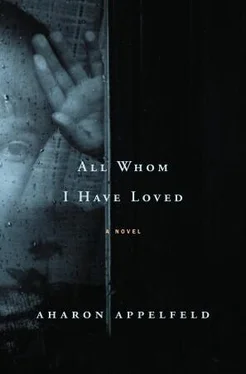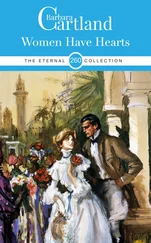“Mother promised to take me to the Carpathians,” I reminded him.
“It won't work out this year. We're close to the end of winter. The snow is melting.”
Later, Father told me that when he was young he had spent a month with a rich Jew who owned tracts of forests in the Carpathian Mountains. He had been hired to create paintings for the man's home, and he did begin to work, but when the rich man's wife saw the paintings, she clutched her head with both hands and shouted, “I don't want these paintings in my home — they depress me!” At first the husband tried to convince her that it was good art, showing her articles that praised Father's work, but it didn't help at all. So finally the rich man compensated Father with a substantial sum, and Father left. He told the story without bitterness, as if it were just a fleeting episode and not an unpleasant one.
While this was going on, I got a telegram from Mother: SICK WITH TYPHUS. CAN'T COME. LOVE YOU. MOTHER.
I showed it to Father. He read it and said nothing.
Victor came by in the afternoon, talking enthusiastically of the need to encourage real art as a shield against the darkness. Father didn't agree with him; he claimed that art no longer had a place in the face of the evil and vulgarity that had overtaken life. Victor's attempts to ease Father's despair were futile. “Bucharest is no different from Czernowitz,” claimed Father, “and it's doubtful that the epidemic can be kept from spreading.”
I was sad to see Father in such despair. Only a few weeks before, he had been happy and painting feverishly, but since the opening of his exhibition, he'd been angry, with furious words on the tip of his tongue. Now Victor took him only out to the country. They didn't bully us in country taverns, perhaps because they couldn't tell the difference between a Jew and someone from the city.
Then some of Victor's friends came to the house. They made toasts, joked around, and called the anti-Semites derogatory names. They spoke about the people running the country and about distant lands, and the heavy atmosphere lifted somewhat.
After the guests had gone, Father said, “We must set off immediately to see how Mother is doing.”
“When?”
“As soon as possible.”
It's hard to guess what Father's reactions will be. They're so sudden.
At first Victor tried to talk him out of the hasty journey, but when he saw that Father's mind was made up, he stopped. For a few days Father was caught up in a strange frenzy, tearing up papers and sketchbooks and talking about the need to arrange his life differently. “The house is yours,” Victor kept promising. “Any time you'd like to return, just come.”
Father didn't thank him but simply repeated, “Right now I have an urgent journey.” The bottle of cognac was constantly on the table, and before uttering anything, Father would take a swig.
Just before we left, Victor came by and gave Father a wad of banknotes. He promised Father that he would buy any of the paintings that weren't sold in the exhibition and would send him the money anyplace Father wanted. Father was embarrassed. He shoved the banknotes into his coat pocket and thanked Victor with short bows. “As soon as Henia's health improves,” he promised, “I'll rent a studio and I'll start to work.”
We hardly packed for this trip. Father put my clothes into one suitcase and his into a duffel bag. The math books and the rest of the schoolbooks were left, for we both agreed that I wouldn't need them any longer. Victor was embarrassed, and he kept apologizing for the dismal atmosphere in the capital. Father was distracted. He kept patting his coat pockets and muttering, “I must first get to Storozynetz; when I'm there, I'll decide what to do.”
Then Father sat in the living room with Victor, and I went from room to room. Since Father had decided on this journey, it had felt strange there, as though the spacious rooms filled with handsome things were about to be taken away from me and would soon be erased from my memory. I was sad about losing the visions of light that had been revealed to me there, and I tried to see them again so as to store them away inside me. But for some reason they resisted this, and my feelings were slowly being planted elsewhere.
Father got to his feet and said, “We have to go.” Outside there was a fierce, snow-filled wind. Victor was sorry that he hadn't brought a sleigh.
“Don't worry,” Father said, “it's not far to the tram, and we can do it in half an hour.” His face was red, and he could hardly stand.
So we set out. On the way, Father told Victor about an art critic named Zeigfried Stein, who had written some nasty reviews of his early exhibitions. And as if this weren't enough, Stein then traveled to each place that Father's paintings were being shown, declaring publicly that this was dangerous, decadent art and should be banned.
“And what did you do?” asked Victor.
“I wanted to thrash him, but God got there first and shut him up.”
“What happened to him?”
“He drowned in the river.”
The train came on time. There were hundreds of people on the platform. Victor embraced Father, and tears coursed down his cheeks.
“Look after yourself.” He spoke as if he wasn't Father's agent but his father.
“I promise you.”
“You must paint,” Victor persisted. “Every hour is precious.”
“I'll get myself a studio first thing.”
“Just telegram me and I'll send you anything you need.”
“Thank you, my dear friend.”
“Don't thank me.”
“But I want to thank you.”
“There's no need. Good-bye, dear friend. Don't forget to write me. I'm not going to budge from here.”
And with these hurried words we parted from Victor and were pushed into our compartment. There were no longer any empty seats, and Father regretted not taking Vic-tor's advice to buy seats in first class. He sat me down on the suitcase and stood next to me. I was tired, but I saw clearly the spacious house in which Victor had put us up, the chests of drawers, the wide beds, and the great light that streamed in from the large windows. Now it all seemed distant and imaginary, as if I hadn't ever been there.
I asked Father if we would return to Bucharest.
“Of course we'll come back. In Bucharest we have such a true friend. He'll welcome us with open arms whenever we come.”
I sensed the trembling in his legs, and it hurt me that he had no place to sit down.
Then I fell asleep and I saw Mother. She was in a swimsuit, sitting alongside the stream and preparing a midmorning snack. Her face was clear and open, and a bright smile played upon her lips.
“Mother,” I said.
She turned her head slowly toward me. I'd always known this way she had of turning her head, but now it was as if I were seeing it for the first time. I felt her love for me, and I was gripped by silence. She immediately explained that she'd wanted to come to me at Christmas and take me to the Carpathians, but things hadn't worked out. I didn't know what she was talking about, and I wasn't going to ask her. Her love was so apparent that it completely overwhelmed me.
“Mother,” I said again.
“What, my love?”
“How long will we be here?” I tried to hold her attention.
“All the time,” she replied after a brief pause.
“And I won't see Father anymore?” I asked, then regretted it.
“I, at any rate,” she said in a tone that I recalled well, “intend to make the summer vacation last as long as I can.”
“More than a year?”
“More than five years,” she said, with a peal of laughter.
“And we won't leave here?”
“Why should we leave?”
Читать дальше












